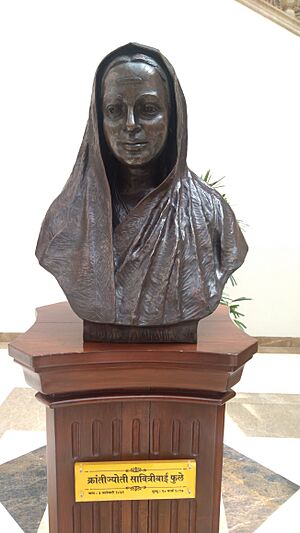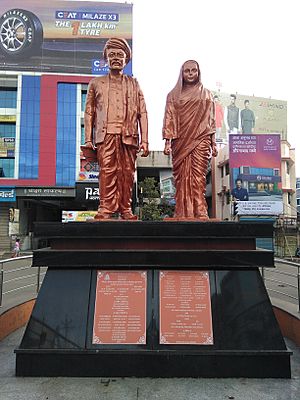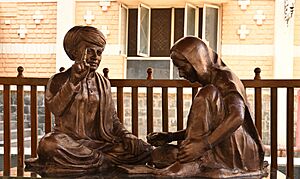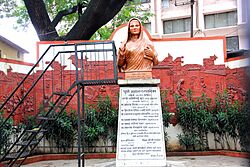Savitribai Phule facts for kids
Quick facts for kids
Savitribai Jyotirao Phule
|
|
|---|---|

Bust of Savitribai Phule.
|
|
| Born | 3 January 1831 |
| Died | 10 March 1897 (aged 66) |
| Alma mater |
|
| Occupation | Teacher, activist, social reformer |
| Era | 1831- 1897 |
| Organization | Satya Shodhak Samaj |
| Known for | Girl's education, Women's emancipation |
|
Notable work
|
• Bavankashi Subhodh Ratnakar |
| Spouse(s) | Jyotirao Phule |
Savitribai Phule was a very important person in India's history. She was one of the first female teachers in India. She was also a social reformer, which means she worked to make society better. Savitribai was also a poet.
Along with her husband, Jyotiba Phule, she worked hard to improve women's rights in India. Many people see her as a leader of India's movement for women's equality. She wanted to end unfair treatment based on a person's background or gender. Savitribai and her husband were pioneers in educating girls in India. They opened their very first school for girls in 1848 in Pune.
Contents
Early Life
Savitribai Phule was born on January 3, 1831. Her birthplace was a village called Naigaon in Maharashtra, India. This village is about 15 kilometers from Shirval. It is also about 50 kilometers from Pune.
She was the youngest of four children. Her parents were Lakshmi and Patil. They belonged to the Mali community. Savitribai married Jyotirao Phule when she was about 9 or 10 years old. Jyotirao was 13 at that time.
Her Education Journey
When Savitribai got married, she could not read or write. Her husband, Jyotirao, taught her at home. He also taught his cousin, Sagunabai Shirsagar.
After learning the basics from Jyotirao, Savitribai continued her studies. She learned from Jyotirao's friends. She then joined two special training programs for teachers. One was in Ahmednagar and the other in Pune. Because of her training, Savitribai might have been the first female Indian teacher and school principal.
Starting Schools for Girls
After becoming a teacher, Savitribai Phule started teaching girls in Pune. She worked with Sagunabai Kshirsagar, who was Jyotiba Phule's sister. Sagunabai was also a strong supporter of women's rights.
Soon, Savitribai, Jyotirao, and Sagunabai opened their own school. It was at the home of Tatya Saheb Bhide, called Bhidewada. Tatya Saheb Bhide was inspired by their work. The school taught subjects like math, science, and social studies.
By the end of 1851, Savitribai and Jyotirao Phule were running three schools for girls in Pune. About 150 students were enrolled in these schools. Their teaching methods were different from government schools. Many people thought the Phules' methods were better. Because of this, more girls went to their schools than boys went to government schools.
However, their success also brought challenges. Some people in the community had very traditional views. In 1839, Jyotirao's father asked the couple to leave his home. He believed their work was wrong according to old customs.
After leaving his father's home, the Phules moved in with a friend, Usman Sheikh. There, Savitribai met Fatima Begum Sheikh. Fatima became a close friend and colleague. Fatima already knew how to read and write. Her brother Usman, who was Jyotiba's friend, encouraged her to become a teacher. Fatima and Savitribai went to the Normal School together and both became teachers. Fatima Sheikh was the first Muslim woman teacher in India. In 1849, Fatima and Savitribai opened a school in Sheikh's home.
In the 1850s, Savitribai and Jyotirao Phule helped create two educational groups. These groups were for schools for boys and for people from certain communities. Savitribai Phule and later Fatima Sheikh led many of these schools.
Jyotirao once explained their work in an interview in 1853. He said that a mother's influence on a child is very important. He believed that if a country wants to grow, people must educate women. He started the girls' school with this idea. He mentioned that his own father threw them out for educating girls. But some people, like Lahuji Ragh Raut Mang and Ranba Mahar, helped convince others to send their children to school.
Together with her husband, Savitribai taught children from all backgrounds. They opened a total of 18 schools.
Personal Life
Savitribai and Jyotirao did not have their own children. It is believed they adopted a boy named Yashawantrao. He was the son of a widow. When Yashwant was going to get married, some people did not want to give him a girl because of his birth. So, Savitribai arranged his marriage to the daughter of Dynoba Sasane, who worked with her organization. This happened in February 1889.
Her Heroic Death
In 1897, a serious illness called the bubonic plague spread. Savitribai and her adopted son, Yashwant, opened a clinic. They treated people affected by the plague. The clinic was set up outside Pune, in an area free of the illness.
Savitribai died a heroic death while trying to save a young man. She learned that Pandurang Babaji Gaekwad's son had the plague. Savitribai quickly went to him and carried him on her back to the hospital. While doing this, Savitribai caught the plague herself. She passed away at 9:00 pm on March 10, 1897.
Her Writings and Other Work
Savitribai Phule was also a writer and a poet. She published a book of poems called Kavya Phule in 1854. She also published Bavan Kashi Subodh Ratnakar in 1892. One of her famous poems is "Go, Get Education." In this poem, she encouraged people who were treated unfairly to get an education and become free.
Because of her experiences, she became a strong supporter of women's rights. She started the Mahila Seva Mandal. This group worked to raise awareness about issues important to women. Savitribai also wanted a place where all women could gather, no matter their background. She made sure everyone sat on the same mat to show equality. She also spoke out against child marriage. She supported widows being able to remarry.
Her Lasting Impact

Savitribai Phule's work for girls' and women's education is still highly respected today. Her legacy continues to inspire many people.
- Along with B. R. Ambedkar and Annabhau Sathe, Phule has become a symbol for many communities. Women often celebrate her birthday, called Jayanti, with processions.
- The Pune City Corporation built a memorial for her in 1983.
- On March 10, 1998, India Post released a special stamp to honor Phule.
- Savitribai's birthday, January 3, is celebrated as Balika Din (Girl Child Day) across Maharashtra. This is especially true in girls' schools.
- In 2015, the University of Pune was renamed Savitribai Phule Pune University in her honor.
- On January 3, 2017, the search engine Google celebrated her 186th birthday with a special Google doodle.
See also
- Women in India
 | Anna J. Cooper |
 | Mary McLeod Bethune |
 | Lillie Mae Bradford |



